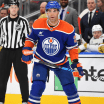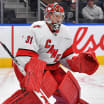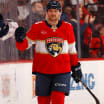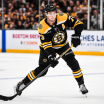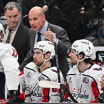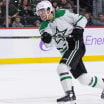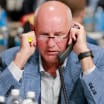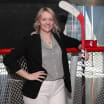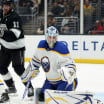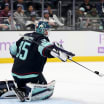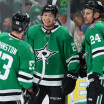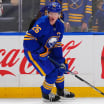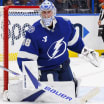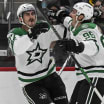The 2022 Hockey Hall of Fame induction is Monday. This year's class includes Herb Carnegie in the Builders category, as well as former players Roberto Luongo, Daniel Sedin, Henrik Sedin, Daniel Alfredsson and Riikka Sallinen. Here, NHL.com senior writer Dan Rosen profiles Henrik Sedin.
Henrik Sedin proved Canucks right en route to Hall of Fame
Faith validated after moves made to draft center; twin brother Daniel also being inducted
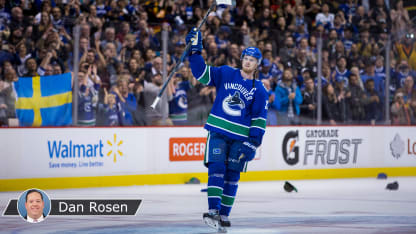
Henrik Sedin
never cared that the Vancouver Canucks took him with the No. 3 pick in the 1999 NHL Draft, one spot after his twin brother,
Daniel Sedin
. To Henrik it didn't matter. It could have been reversed and it wouldn't have made a difference.
"Deep inside I knew I'm as good as Danny," Henrik said. "I knew that all the way from growing up."
But the competitor in Henrik still thought he had to prove it, because back then he felt Daniel was seen as a better player.
"A lot of people thought I only got picked third was because he got picked second, that that was the only reason I got picked that high," Henrik said. "Being picked third did not matter at all, but I know a lot of people thought I maybe should have been picked seventh, eighth or ninth, but because they couldn't take the chance of someone else picking me that's why they made all the moves to get us both."
RELATED: [Daniel Sedin's shift in position, mindset led to Hockey Hall of Fame]
The Canucks picked Henrik third because they trusted with Daniel on his left wing, he would eventually turn into the center, the NHL player, Vancouver legend and Hockey Hall of Famer he became.
Henrik will be inducted into the Hall of Fame with Daniel, his twin who is six minutes younger, former Canucks teammate Roberto Luongo, fellow Sweden native Daniel Alfredsson, Riikka Salinen and the late Herb Carnegie in the Builders category as part of the 2022 class Monday.
He's going in as the Canucks' all-time leader in assists (830), points (1,070) and games played (1,330). He assisted on 280 of Daniel's Canucks-record 393 goals. He played 24 more games and finished with 29 more points than his twin.
"The twin thing makes it extra special with the legacy they left behind with the trick plays they made together, like the high tip on the power play, the fake slap shot into the bumper, the back pass on an icing play where Danny would skate into it on a breakaway, the way they would sauce the puck all the time on 2-on-1s," retired Canucks forward Alexandre Burrows said. "But I have to believe they would have been able to do it individually if they would have played on different teams."
NHL stars reflect on Sedin Brothers HHOF induction
Brian Burke, the former Canucks general manager who with the front office made the moves to be able to select Daniel with the No. 2 pick and Henrik at No. 3, said the best test for why Henrik is a Hall of Famer with or without his brother came in the 2009-10 season.
Daniel missed 18 games from Oct. 11-Nov. 20 with a foot injury. In that time, Henrik led Vancouver with 10 goals and 18 points, sending him on his way to an NHL career-best 112 points (29 goals, 83 assists). He won the Art Ross Trophy as the leading scorer and the Hart Trophy as the most valuable player.
"When Danny got hurt, he just took it upon himself and led the team," Luongo said. "Just played at a level that was unmatched, and he was able to make guys around him better, and that's why he ended up winning the Hart that year."
\\\
Henrik always knew he could think the game as an NHL player even before he made his debut Oct. 5, 2000, playing 13:08 and going without a point at the Philadelphia Flyers. But he knew when he got to North America that to be an effective NHL player, he had to get stronger.
"The tough part when we came into the League is if you're not going to cheat your way to becoming bigger it's not going to happen over one summer," Henrik said. "That was tough mentally to know how much pressure was on us and also knowing this is not an overnight thing. It's going to take two seasons, three seasons maybe, and to know you have to go through that grind for two or three years before you become physically where you want to be that was mentally very tough."
Once Henrik matured physically, the points followed. He had 29, 36, 39 and 42, respectively, his first four seasons. He had 75 points his fifth season, when he was 25 years old. He wouldn't go below that number until he had 45 points in 48 games of the lockout-shortened 2012-13 season.
He had 50 points in 70 games in 2013-14 but 73 in 82 games the following season before getting 55, 50 and 50 in his last three NHL seasons, retiring with Daniel at the end of 2017-18.
"If you look at his skill set, not a very good shot and I think he'd be the first guy to admit that," retired Canucks defenseman Kevin Bieksa said. "Not a bad skater, but definitely not the fleetest of foot. But his cardio was really good, so he could be the same speed in the first period as he was in the third and that's where he wore a lot of guys down. He never slowed down throughout the course of a game."
And he could handle the physicality.
"In practice, if I ever knocked him off the puck it was a big deal," Bieksa said. "I tried to do it every day and it was very hard to do."
Bieksa, though, said Henrik's mind set him apart, that it was his greatest attribute as a player.
Henrik is known to be one of the most cerebral players of his generation.
"For instance, on the power play, we get a shot on net and the puck would go into the corner," Bieksa said. "'Kes' [Ryan Kesler] would rush into the corner and Danny would rush into the corner, maybe a defenseman, and Henrik would go and stand all the way on the other side of the ice just so they could get that puck and rim it around, instant relief of pressure. The shot-pass, they kind of made the shot-pass famous off the half-wall and that was something he came up with because he knew him shooting the puck from the half-wall wasn't going to be that dangerous so the redirection with Danny would make it really dangerous."
And the passes into space that Daniel would skate onto in stride, that was a result of seeing the ice better than everyone.
"I think it comes from soccer, or at least a big part of it," Daniel said. "We both played soccer growing up and in soccer you rarely pass the ball to the player. You pass to where the player is going to run into the ball. I think that was his biggest strength as a passer. He rarely passed it to you. He passed it to a place where you were going. I think that always kept you moving and also, I think, that's how you play fast. That was something he always had in his game."
Bieksa also marveled at Henrik's ability to give clean passes, whether they were into space or on the tape.
"In practice when the ice was really bad, snow everywhere, pucks hopping over guys sticks, Henrik never had a puck hop over a stick and never gave an end over end pass," Bieksa said. "Everything was always flat. Henrik was the best at being good on bad ice."
It was maddening for opponents, and Vancouver's goalies in practice.
"Everybody knew it was coming … 'Hey, when Henrik has the puck behind the net, go find Daniel and stand next to him and don't let him score,'" former Canucks goalie Cory Schneider said. "And yet Henrik would still find Daniel to score. It's kind of like when a pitcher is going to throw you his fastball and you know it's coming, and you still can't hit it."
\\\
Henrik took over as Canucks captain Oct. 9, 2010. But he was already a leader before he got the 'C' stitched onto his sweater because of his ability to read a room and bring levity when needed.
Bieksa recalled a time when the Canucks were in the dressing room in Denver after a particularly bad first period. It was during the 2009-10 season, when Luongo was captain.
"So in between periods, Roberto for the first time, probably because he felt obligated because he was the captain, he gets up and he starts yelling at us like, 'Guys, what are we doing out here, let's get our stuff together, what forecheck are we doing out there?'" Bieksa said. "He was basically saying we weren't playing our system, but he kind of doesn't really know what the system is because he's a goalie. Then Henrik -- and he never said boo and never chirped anyone, but he's sinking in his stall, and I can see him from across the room -- goes, 'Just stop the puck, Lu.'"
Bieksa said Henrik wasn't trying to show up Luongo, shut him up or anything like that. There was a massive amount of respect for Luongo in that room, but in that moment, Henrik read it right. The room needed a laugh and Henrik provided the levity.
"'Louie' is like standing in the middle of the room with his goalie equipment on and he goes, 'What?'" Bieksa said. "He thought he heard it, but he didn't, and so Henrik said it again, this time with one of those smiles, 'Just stop the puck, Lu, we got the rest.' And the room just erupted in laughter and Roberto started laughing. We went out and had a good rest of the game."
That story describes Henrik's leadership style, both in the room and on the ice. He would speak when needed, and always lead by example.
"Action driven," Burrows said.
That's what the Canucks were hoping for when they picked him third in the draft 23 years ago.
Henrik proved it.

